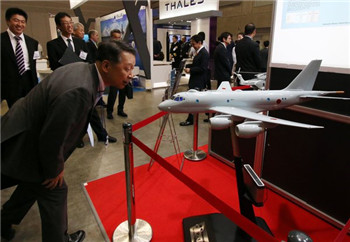日本横滨——一些以生产摩托车、洗衣机和笔记本电脑闻名的日本大公司,正在向全球推销另一种产品:重型军事装备。
YOKOHAMA, Japan — Some of Japan’s biggest companies, best known for motorcycles, washing machines and laptop computers, are pitching a new line of global products: military hardware.
悄无声息的攻击型潜艇。两栖搜救飞机。用激光精确定位正在靠近的敌人的船载雷达系统。
Quiet-running attack submarines. Amphibious search-and-rescue planes. Ship-mounted radar systems that use lasers to help pinpoint approaching enemies.
在日本政府坚守武器出口禁令近50年之后,这个半和平主义国家的三菱(Mitsubishi)、川崎(Kawasaki)、日立(Hitachi)、东芝(Toshiba)及其他军事承包商,正在小心翼翼却明白无误地告诉世界,它们在做这门生意。
After a ban on weapons exports that the Japanese government had maintained for nearly 50 years, Mitsubishi, Kawasaki, Hitachi, Toshiba and other military contractors in this semipacifist country are cautiously but unmistakably telling the world they are open for business.
横滨今年5月举行了一个海上安全博览会,其组织者和参与者说,这是日本举办的第一个军工行业贸易展。实际上这也是日本制造商第一次出现在这类展览中。
A maritime security exposition here in May was the first military industry trade show in Japan, organizers and participants said. And it was the first anywhere to feature the Japanese manufacturers.
“我从来没有见过它们,”澳大利亚军方的采购专家、经常参加世界各地博览会的米克·费尔韦瑟少将(Mick Fairweather)表示。“以后这种情况会越来越多。”
“I’ve never seen them,” said Maj. Gen. Mick Fairweather, a procurement specialist with the Australian armed forces, who regularly attends such expos around the world. “It’s going to be a growing thing.”
在二战中战败后。日本的军事实力受到限制。去年,首相安倍晋三(Shinzo Abe)解除了军事出口禁令,并采取了其他一些解除限制的措施。
Prime Minister Shinzo Abe lifted the prohibition on military exports last year, part of a loosening of restrictions on Japan’s military power that were put in place after its defeat in World War II.
虽然很多日本民众反对这种变化,但安倍晋三说早就应该这么做了。日本与近邻中国之间的关系时好时坏,中国日益增长的实力为安倍晋三的主张增加了说服力。
While much of the Japanese public opposes the changes, Mr. Abe says they are long overdue. The growing might of China, Japan’s close but not always friendly neighbor, has added force to his argument.
安倍晋三正在依靠军事相关贸易的增长来巩固与其他一些国家的联系。这些国家同在亚太地区,同样对中国怀有戒心。在日本的潜在客户名单上,东南亚国家和印度排名很高。
Mr. Abe is counting on increased military-related trade to help cement ties with other countries in the region that share Japan’s wariness of China. Southeast Asian nations and India are high on the list of potential customers.
日本希望同在太平洋地区的民主国家澳大利亚成为苍龙级潜艇的买家。三菱重工和川崎造船公司研发的这种潜艇造价约500亿日元,约合25亿人民币,使用超静音的柴油和电力驱动,敌人很难发现它们。
Japan hopes Australia, a fellow Pacific democracy, will be a receptive market for Soryu-class submarines, built by Mitsubishi Heavy Industries and Kawasaki Shipbuilding. The subs, which cost about 50 billion yen, or $410 million, use ultraquiet diesel-electric drives that make them hard for adversaries to detect.
三菱重工还在研发一种两栖突击车,用于在环境恶劣的海岸进行登陆作战。它可能最终会与美国海军陆战队使用的一些由美国设计的载具开展竞争。
Mitsubishi Heavy is also working on a prototype amphibious assault vehicle, used for landing troops on hostile seashores, that could eventually compete with American-designed vehicles used by the United States Marine Corps.
在国外,很多人都说不出日本有哪些军工制造商。即使在日本,该行业也很少做宣传。
Many people outside the country would struggle to name a Japanese arms manufacturer. Even in Japan, the business is little publicized.
但是,该国一些大型工业集团早已在生产军工产品,为日本军队自卫队提供包括坦克和飞机在内的各种设备。除了极少数例外情况,日本政府一直是这些公司唯一的客户。
But some of the country’s large industrial conglomerates have long had sidelines in military production, supplying a variety of equipment, including tanks and planes, to the Japanese military, the Self-Defense Forces. With rare exceptions, the Japanese government has been their only customer.
“你不打仗,对军事工业发展就没有多大帮助,”桃山学院大学(Momoyama Gakuin University)政治和国家安全教授松村昌广(Masahiro Matsumura)说。
“When you don’t fight wars, it doesn’t exactly help the arms industry,” said Masahiro Matsumura, a professor at Momoyama Gakuin University who specializes in politics and national security.
日本的工业产值中,只有不到1%与军事相关。在观察组织斯德哥尔摩国际和平研究所(Stockholm International Peace Research Institute)的名单中,只有四家日本公司名列全球百强武器生产商榜单。其中最大的三菱重工,其军事销售收入不到美国头号军事承包商洛克希德·马丁公司(Lockheed Martin)的十分之一。
Less than 1 percent of Japan’s industrial output is military-related, and only four Japanese companies are among the top 100 arms producers ranked by the Stockholm International Peace Research Institute, a watchdog group. The biggest, Mitsubishi Heavy Industries, earns less than a tenth the revenue from military sales as the top American military contractor, Lockheed Martin.
松村说,由于生产批量小,日本的重型装备比较昂贵。另一个障碍则是缺乏实战经验。
Small production runs make Japanese hardware relatively expensive, Professor Matsumura said. And a lack of real-world experience presents an additional hurdle.
“美国打了很多仗,所以获得了武器性能的反馈,”他说。“日本没有打仗,所以也没有反馈。”
“The U.S. fights a lot of wars, so they get feedback on the performance of their weapons,” he said. “Japan doesn’t fight, so there’s no feedback.”
日本自第二次世界大战以来没有出兵作战过,其战后宪法放弃用武力“作为解决国际争端的手段”。安倍政府正在进行的改革包括制定新法律,让自卫队可以在更广泛的环境下前赴国外开展行动,其中包括为美国等盟友承担防务。
Japan has not sent troops into combat since World War II, and its postwar constitution renounces the use of force “as a means of settling international disputes.” Among the changes Mr. Abe’s government is enacting are new laws that will allow the Self-Defense Forces to operate abroad in a wider array of circumstances, including to defend allies like the United States.
为了启动军事出口市场,日本将为买家提供财政援助。例如信用担保可以降低用于贸易的贷款利息,让发展中国家能买得起日本的武器。在过去一个月里,日本已经开始与马来西亚和菲律宾谈判涉及军火的贸易协定。
To seed the market for military exports, Japan is offering financial aid to buyers. Credit guarantees, for example, would make buying weapons from Japan more affordable for developing countries, by lowering interest rates on the loans used to finance deals. In the last month, Japan has begun negotiating military-related trade agreements with Malaysia and the Philippines.
印度已经表示了对大载重量水上飞机US-2的兴趣,这是新明和工业(ShinMaywa Industries)为日本海军研制的产品。该公司更有名的产品是自卸卡车,以及机场使用的乘客登机桥。US-2可以帮助印度军方巡逻队前往与印度洋大陆相距数百英里的遥远群岛,比如安达曼和尼科巴群岛。
India has already expressed interest in a large-capacity seaplane, the US-2, built for the Japanese navy by ShinMaywa Industries, a manufacturer better known for dump trucks and the passenger boarding bridges used at airports. The US-2 could help the Indian military patrol distant island chains like the Andaman and Nicobar, hundreds of miles from the mainland across the Indian Ocean.
往往与政府之间存在密切联系的巨头公司,在军工市场上占据着支配地位,要进入这个市场并不容易。专家说,在很多领域,日本最好的选择可能是合作而不是开展直接竞争。
Breaking into a market dominated by established giants, often with close ties to governments, will not be easy. In many areas, specialists say, Japan’s best bet is probably to cooperate rather than compete head-to-head.
他们说,日本最有市场的产品是相对不起眼的组件,比如图像传感器和碳纤维飞机零件。很多这种组件在最初研发时,考虑的都是民用领域。
Japan’s most marketable products, they say, are relatively inconspicuous components, like image sensors and carbon-fiber aircraft parts, many originally developed with civilian applications in mind.
“我们出产了一些优秀的零部件和子系统,但是如果我们打算生产整个系统,比如下一代战机,全靠自己研发是不可能的,”前防卫大臣的森本敏(Satoshi Morimoto)说。
“We make some excellent parts and subsystems, but if we intend to produce whole systems, like next-generation fighters, it’s impossible to develop these things on our own,” said Satoshi Morimoto, a former defense minister.
尽管新近获得了出口军事产品的自由,和一个有争议的产业牵扯在一起,还是让日本企业感到担心。
Despite their new freedom to export, Japanese companies remain wary of being associated with a controversial industry.
“这里的大多数东西都不是很像武器,”博览会上川崎展台的直升机销售代表良文草香(音)说。他还表示,日本公司没有展示枪炮、导弹和其他明显具有威胁性的装备。
“Most of the things here aren’t very weaponlike,” said Yoshibumi Kusaka, a helicopter sales representative on duty at Kawasaki’s booth at the expo, noting the absence of guns, missiles and other blatantly threatening gear from the Japanese companies’ displays.
